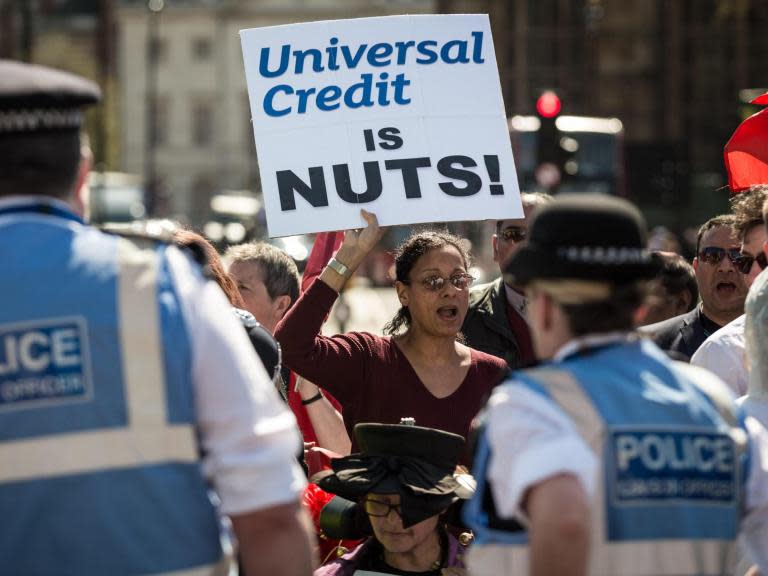When the UN says British austerity is misogynistic, we should listen
Following a 12 day investigatory tour of the UK, Philip Alston, the UN’s special rapporteur on extreme poverty, not only concluded last Friday that the UK government’s austerity policies have inflicted “great misery” on the 14 million people living in poverty in the UK, but also damned its welfare system as “so sexist it may as well have been compiled by “a group of misogynists in a room”.
Today Amber Rudd did her first speech as work and pensions secretary – and, bizarrely, she hit out at what she called the “extraordinary political language” of the report, implying that it shouldn’t be listened to because of some nefarious ideological agenda.
Amidst the surge of food banks and huge cuts to council funding, the UN’s report was particularly critical of the scheme Rudd will now be responsible for, Universal Credit (UC), the controversial benefit system that merges six payments into one.
Where does sexism come into this unprecedented report on the government’s austerity policies? – In the detrimental impact that UC could have on victims of domestic abuse. Charities such as Women’s Aid have vehemently campaigned against the new system that pays a single household payment to couples on UC. They warn this will increase the risk of domestic abuse by giving perpetrators more opportunity to exert control over a partner.
The Work and Pensions Committee have heard evidence from charities and housing experts on the failings of the one payment system, claiming that victims who have tried to request separate payments have experienced abuse from perpetrators who found out. The government’s justification for not splitting benefits by default payments was that UC is meant to “mirror the world of work”.
Surely it is time to draw the line on the Conservative’s obsession with getting people into work, when their blindsighted policies could increase the risk of domestic abuse? This arguably misogynistic dismissal is yet another example of how women are failed by the welfare system. The suggested resolution of a separate discretionary payment to domestic abuse victims ignores the potentially fatal consequences of a perpetrator finding out that their partner has applied for such funding.
Not to mention that this payment could only be accessed through visiting a Job Centre; women in abusive relationships often can’t leave their homes, having enough change for a taxi fare to escape to a refuge is quite literally, a life-saving necessity. This dangerous oversight threatens to eliminate the ounce of freedom that women in abusive relationships have, and is a hard-hitting example of the UN’s claim that austerity is “driven by a political desire to undertake social re-engineering rather than economic necessity.”
UC is just the tip of the iceberg when it comes to misogynistic welfare policy. Refuge provision has been hit hard by austerity; one in six have closed since 2010, with the need for them increasing considering the rise in recorded domestic abuse-related crime.
Earlier this year, the government backed down on “disastrous” plans to limit housing funding for women’s refuges, which according to Women’s Aid, would have forced over half of the UK refuges to close, leaving thousands of women and children at risk of homelessness.
Not only is it a national embarrassment that the UN are investigating poverty in the fifth richest country in the world, but in the current #MeToo climate where society is being forced to wake up to the dangerous consequences of patriarchy – the misogynistic reality of the Universal Credit system needs to be addressed by the government.
Alston’s damnation is difficult to ignore: “If you got a group of misogynists together in a room and said ‘how can we make a system that works for men but not women?’ they wouldn’t have come up with too many other ideas than what’s in place.”
The government’s immediate refusal to acknowledge this reality is troubling; after concluding that single household payments under UC will increase the risk of domestic abuse, Alston claims that Esther McVey, the former Work and Pensions Secretary, said that “90 per cent of people the UK have joint bank accounts anyway so what’s the problem?” This unforgivable ignorance further entrenches the UN’s findings that “British compassion for those who are suffering has been replaced by a punitive, mean-spirited and callous approach.”
The Work and Pensions Committee have not only heard copious evidence on the consequences of UC for domestic abuse victims, but have now received criticism by an extreme poverty and human rights inquiry on the way policies impact women, yet still refuse to listen. This cold, economically driven attitude is a disgrace to the 1.2 million women who experienced domestic abuse in England and Wales last year and the refuge managers, support workers, and charities who work endlessly to fight for women’s rights.
The government has no option other than to act upon to the UN’s evidence that Universal Credit increases the risk of domestic abuse; when such austerity policies are threatening the lives of women.

 Yahoo News
Yahoo News 

